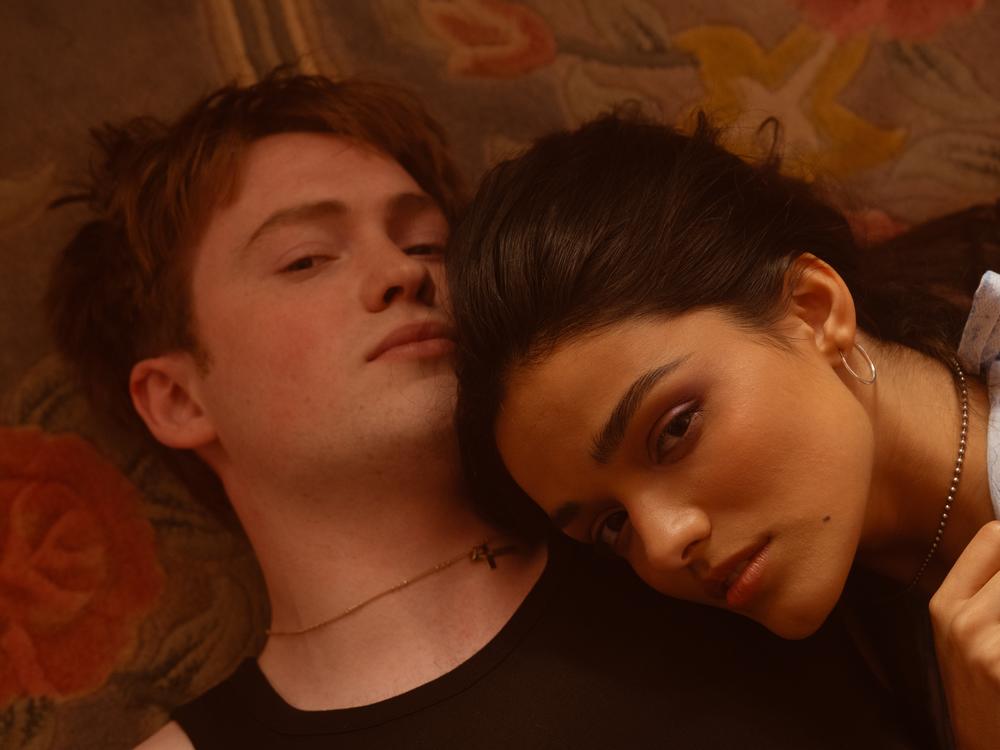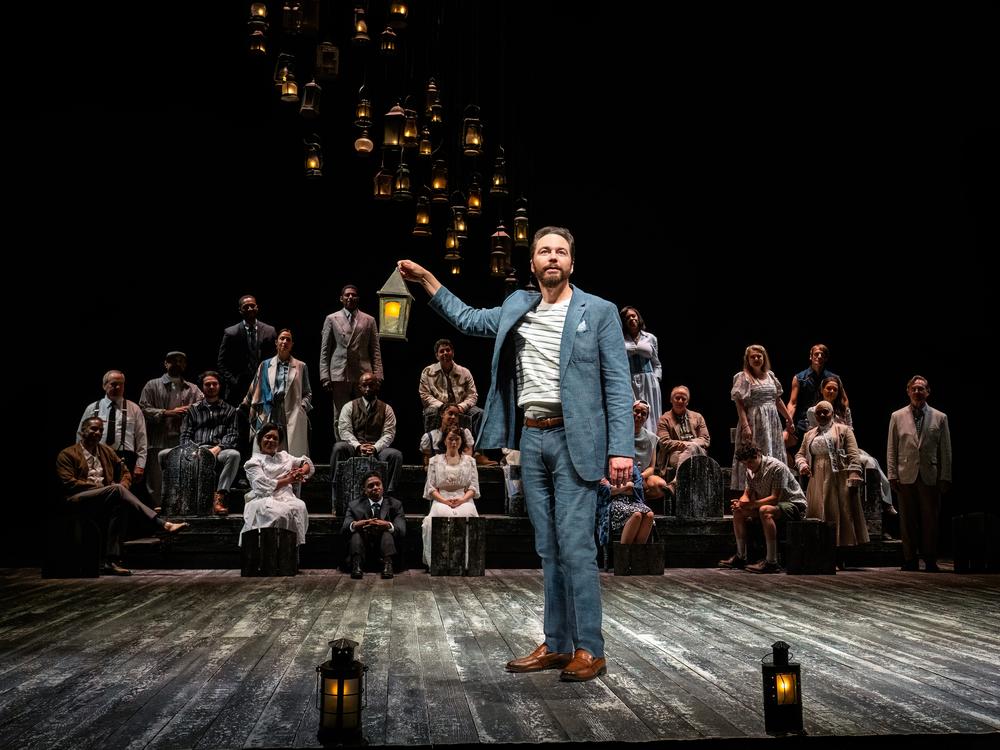Section Branding
Header Content
How to buy cheap(er) Broadway tickets
Primary Content
It's the time of year when people think about visiting New York City for the holidays — and maybe seeing a Broadway show. It's an exciting season to do that, since celebrities are all over Broadway this year (Robert Downey Jr. is on stage until after Thanksgiving; George Clooney's coming this spring. But there's also Jim Parsons, Mia Farrow, Daniel Dae Kim, Kit Connor...).
Then again — you may be scared away by stories about $800 tickets.
As a former theater critic and a long-time arts reporter, the question I’m asked most often is: How can I get affordable tickets? I’ve steered friends, relatives and colleagues toward cheaper (if never cheap) seats. Here’s my best advice:
Be flexible, if you can.
Do you want to see a particular show (you’re a Sondheim fanatic, there’s a celebrity you love) or is it just that a Broadway show is on your bucket list? Are you flexible on dates and times? Do you care where you sit? If you can be flexible, you’ll have a better chance at finding less expensive tickets. Not every ticket costs hundreds of dollars. There are plenty of options below $100 each, especially if you’re open to seeing almost anything, or at least a wide variety of shows.
Ticket prices change depending on the day, the capacity of the theater and the seat — pricing can be fluid and depend on weekly popularity of a show. If you can, check prices for a few days and compare. The difference could be significant.
And then there are the dead times of year: January, February and September. Those are great times to buy a Broadway ticket. During these months, you can look out for Broadway Week, which offers 2-for-1 tickets, and Kids’ Night on Broadway, when a child is free with an adult, usually in February.
And then there’s seat location. Seats with an obstructed view or partial view (you may not be able to see the whole stage) and seats that are in back of the highest balcony will cost you less.
Where to look
Shows that are in previews — that is, before their opening date, when they’re still working out kinks and haven’t been reviewed by the mainstream media — are often less expensive. Shows that are struggling are often sold for less. Long-running shows (Chicago), may be priced much lower than a show that just won Best Musical at the Tony Awards (The Outsiders). Plays often cost less than musicals (though not when there are super-famous people in them).
If you want to see how ticket prices are trending, you can check out the weekly Broadway grosses, put out by the Broadway League, which details how full a theater was the previous week. A show that’s at 70% capacity is going to have lower-priced tickets than a show that’s regularly at 100% capacity. And yes, that means it’s not as popular at the moment — but it doesn’t mean you’ll like it less!
But what if your daughter really wants to see Kit Connor?
Are Broadway tickets ever sold at a discount? Yes. (Might not happen for this show, though!)
Discount codes: Discount codes are often available from New York Show Tickets, TheaterMania, BroadwayBox and Playbill. Some employers offer benefits like Working Advantage, which also has discounts. Some credit cards have special orchestra pricing. If you have a large family of 15 or more who are visiting and can book well in advance, you may be able to take advantage of group ticket pricing.
The lotteries: You can put your name in for tickets in advance and hope you’re the lucky winner – they usually run for one to four tickets and cost $30-40 per ticket. Bad news: you won’t be able to choose your tickets. Good news: most lotteries are now done online instead of waiting in line. Different productions use different lotteries, which may include TodayTix or Lucky Seat. Some lotteries are for the next day — others are for the next week — so you’ll need to visit the show website for details. You’ll have a very limited amount of time to respond if you’ve won, often about an hour, so be sure to check your email/texts regularly.
Rush tickets: Rush tickets are significantly discounted, day-of tickets. To buy them, go to the box office as soon as it opens on the day of the show (you may be able to get standing room tickets then, too.) These tickets are often taken from the remaining seats available, which means that you may not be able to sit with other members of your party. Pro tip: Buying tickets at the box office saves you ticketing fees, even if you are buying full-price tickets.
You can also buy discounted, same-day tickets through TodayTix or by going in person to one of TDF’s two locations: Duffy Square on Broadway at 47th St. in Times Square (look for the large red steps) or Lincoln Center (this one is inside the David Rubenstein Atrium, which makes it better for rainy days). Get there early, be prepared to wait in a long line, and (again!) be flexible.
Resale apps: Many resell sites hike up prices of tickets — though sometimes you can find cheap seats at the very last minute — if you are willing to wait it out. My colleague (and frequent theater-goer) Janet W. Lee recommends the ticket resell app Theatr, which sells for face value or less and often has last-minute deals.
See something Off Broadway — or wait for the road show
Many Broadway shows tour, probably to a place not far from your hometown. The sets may be scaled down, depending on the production, but the casts are terrific and the tickets cost considerably less. Or visit London! Though ticket prices even there have gone up, excellent seats for the most popular West End shows are around $150.
But also, consider Off Broadway! And Off Off Broadway! Some of the best theater in New York is not actually on Broadway, and the further you get from the Main Stem, the smaller and more intimate the experience and the less expensive the ticket. Productions that debut at the non-profit Off Broadway houses like the Public Theater and Second Stage often transfer to Broadway later, so you can tell all your friends, you “saw it when.” And commercial Off Broadway houses often have very popular, long-running shows that are worth seeing, like the current production of Little Shop of Horrors.
If you’re up for seeing Off Off Broadway shows, tickets can be as little as $11 with TDF’s “Go Off-Off and Beyond” membership, which has a one-time $5 fee.
For young theater-goers
There are many, many programs offering less expensive tickets for students or theatergoers under 35 or 40, including tickets in the $30-35 range at Roundabout, 2nd Stage, Lincoln Center, Manhattan Theatre Club, and Playwrights Horizons. Some shows, like The Outsiders, have special rush ticket rates for people under a certain age.
Tips for locals
If you live in the area, you have many more options. You can put your name in for several lotteries weekly and look out for Broadway Week and Kids’ Night on Broadway. If you work for a non-profit, are a student, union member, retiree, veteran, government worker or fall into many other categories, you can sign up for the excellent TDF membership program for $35 a year. Membership gives you the option of buying steeply discounted tickets for Broadway, Off Broadway and Off Off Broadway, with prices ranging from $11 to $60 each. Productions that are sold out will not show up on TDF, but it’s a great way to see shows in previews, shows drawing less of a crowd, or smaller (but often wonderful) productions.
If you don’t qualify for TDF, a good option is a “ticket papering service,” which discreetly fills seats for theaters (and often classical music or jazz concerts as well) to make them appear more popular. It’s simple — you sign up with a membership fee (usually around $100), pay a small fee (about $5 or so) per ticket, and go to the show on your best behavior. To find them, Google “ticket papering services” because they can come and go, but they include services like Play By Play, Theater Extras, Stagelight and Will Call Club. Ask around on social media sites like Reddit to see if a particular service generally has the kind of tickets that interest you.
And if you just want to see great theater and don't care if it's on Broadway? Consider a membership to one of the city’s excellent non-profit theaters, like the Public Theater, New York Theatre Workshop, Ars Nova or Atlantic Theater Company.
Story edited by Meghan Sullivan.



